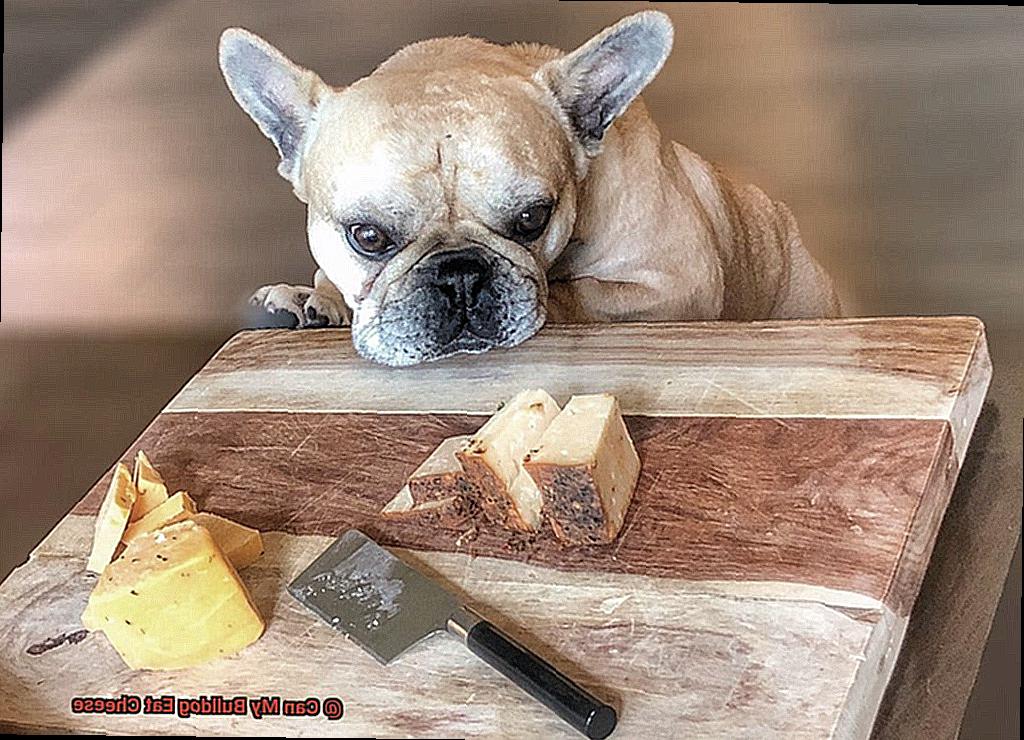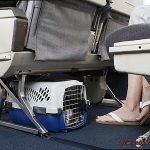Can My Bulldog Eat Cheese?
Those wrinkly-faced wonders that can melt even the coldest of hearts with just one slobbery kiss. As a proud bulldog owner myself, I’ve come to appreciate their unique charm and insatiable appetite for mischief. But when it comes to their diet, it’s like navigating a culinary minefield.
One burning question that often haunts bulldog owners is whether these lovable goofballs can indulge in the cheesy goodness that makes our taste buds dance with joy. So, armed with my love for both bulldogs and cheese, I embarked on a quest to uncover the truth behind this tantalizing query. Join me as we embark on a journey through the mysterious world of bulldogs and cheese – an adventure filled with risks, rewards, and everything in between.
In this blog post, we’ll dig deep into the factors that determine whether cheese should grace your bulldog’s bowl or be banished forever from their diet. From their digestive prowess to potential allergies or sensitivities, we won’t leave any stone unturned in our pursuit of canine cheese enlightenment.
So grab yourself a snack (cheese platter optional.) and prepare to unravel the secrets of bulldogs’ relationship with cheese. Whether you’re an adoring bulldog parent, a self-proclaimed cheese connoisseur, or just someone curious about four-legged dietary quirks, this post aims to equip you with all the knowledge you need to make informed decisions about your furry friend’s gastronomic adventures. Let’s dive right in.
What Is Lactose Intolerance and Why Is It Important for Bulldogs?
Contents
- 1 What Is Lactose Intolerance and Why Is It Important for Bulldogs?
- 2 Do All Bulldogs Have Lactose Intolerance?
- 3 What Are the Benefits of Feeding Cheese to Your Bulldog?
- 4 What Are the Risks of Feeding Cheese to Your Bulldog?
- 5 What Types of Cheese Are Safe for Bulldogs to Eat?
- 6 How Should You Serve Cheese to Your Bulldog?
- 7 How Much Cheese Can a Bulldog Safely Eat?
- 8 Alternatives to Feeding Cheese to Your Bulldog
- 9 Conclusion
As a proud bulldog owner, you want to give your furry friend the best care possible. You may be wondering if it’s safe for your bulldog to indulge in some cheese every now and then. After all, who can resist those adorable eyes when they beg for a taste?
However, before you reach for that cheesy treat, it’s important to understand lactose intolerance and its significance for bulldogs.
What is Lactose Intolerance?
Lactose intolerance is a common digestive disorder that affects both humans and dogs, including our beloved bulldogs. It occurs when the body lacks the enzyme lactase, which is needed to break down lactose, the sugar found in milk and dairy products.
Without enough lactase, the body cannot properly digest lactose, leading to uncomfortable symptoms like bloating, gas, diarrhea, and stomach cramps.
Why are Bulldogs Prone to Lactose Intolerance?
Bulldogs have a higher likelihood of lacking sufficient amounts of lactase compared to other breeds. This genetic predisposition makes them more prone to lactose intolerance. Feeding them foods containing lactose, such as cheese, can result in digestive issues and discomfort.
The Importance of Avoiding Lactose for Bulldogs
It is crucial for bulldog owners to be aware of their pet’s potential lactose intolerance because consuming dairy products can lead to serious health problems. When bulldogs consume foods that their bodies cannot digest properly, it can cause inflammation in the intestines and disrupt the balance of gut bacteria. This can result in chronic digestive issues and even contribute to the development of more severe conditions such as inflammatory bowel disease.
Additionally, feeding bulldogs cheese or other dairy products high in lactose can lead to weight gain and obesity. These foods are often high in calories and fat, which can contribute to excess weight gain if not consumed in moderation. Bulldogs are already prone to weight problems due to their sedentary lifestyle and tendency to overeat, so it is crucial to provide them with a balanced diet that meets their nutritional needs without causing unnecessary health risks.
Can Bulldogs Eat Cheese?
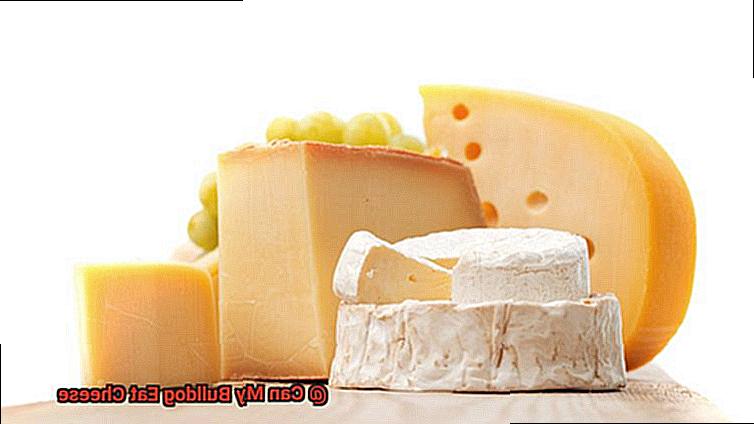
While some bulldogs may have no issues digesting small amounts of cheese, it is essential to monitor their reaction after consuming it for the first time. If you notice any signs of digestive distress such as gas, bloating, or diarrhea, it’s best to avoid feeding cheese to your bulldog. It’s always a good idea to consult with your veterinarian before introducing cheese or any new food item into your bulldog’s diet.
Do All Bulldogs Have Lactose Intolerance?
Well, the answer is not as simple as a yes or no. Let’s take a closer look at why some French Bulldogs may have lactose intolerance while others may not.
Genetics and Individual Variations
Just like humans, dogs can have varying levels of lactose intolerance. This is because lactose intolerance is determined by genetics and individual variations in the production of the enzyme lactase, which is responsible for breaking down lactose. Some French Bulldogs may produce enough lactase to digest lactose without any issues, while others may have a partial intolerance or even a complete intolerance.
Understanding Your French Bulldog’s Tolerance
It is essential for French Bulldog owners to understand their dog’s individual tolerance for lactose. You can start by monitoring their reactions after consuming dairy products. Symptoms of lactose intolerance in French Bulldogs may include diarrhea, vomiting, gas, bloating, and abdominal discomfort. If you notice any of these signs after your French Bulldog has had cheese or another dairy product, it may be an indication that they are lactose intolerant.
Cheese: The Lactose Dilemma
When it comes to cheese, not all types are created equal in terms of lactose content. Some cheeses contain higher levels of lactose than others. For example, fresh cheeses like cottage cheese and ricotta tend to have higher lactose content compared to aged cheeses such as cheddar or Swiss. If your French Bulldog has a mild intolerance, they may be able to tolerate small amounts of low-lactose cheeses without experiencing digestive issues.
Consulting with Your Veterinarian
Before introducing any new foods into your French Bulldog’s diet, especially if they have a known or suspected lactose intolerance, it is always best to consult with your veterinarian. They can provide you with guidance on suitable dietary options and may recommend lactose-free alternatives or enzyme supplements that can help your French Bulldog enjoy dairy products without adverse effects.
What Are the Benefits of Feeding Cheese to Your Bulldog?
If you’re a proud bulldog owner like me, you know that these lovable pups have a big appetite and can be quite picky eaters. But did you know that feeding cheese to your bulldog can have some great benefits? Let’s dig into the cheesy details.
- rotein Powerhouse: Bulldogs need a diet rich in protein to support their growth, repair tissues, and maintain a healthy immune system. Cheese is a great source of protein, making it a paw-some addition to their meals.
- Strong Bones and Teeth: Bulldogs are prone to skeletal disorders, but calcium-rich cheese can help keep their bones and teeth strong. It’s like giving them a cheesy superpower.
- Training Treat Delight: Bulldogs are known for their food motivation, and cheese is a tasty treat that can make training sessions more enjoyable. The strong smell and flavor of cheese make it an irresistible reward for your furry friend.
- Digestion-Friendly: Some bulldogs have sensitive stomachs or dietary restrictions, but cheese is generally well-tolerated by dogs. Just remember to introduce it gradually into their diet and monitor for any adverse reactions.
- Vitamins Galore: Cheese contains essential vitamins like A, B12, and D, which contribute to your bulldog’s overall health. These vitamins support good vision, energy metabolism, and calcium absorption. It’s like giving them a vitamin-packed snack.
- Mental Stimulation: Bulldogs are intelligent dogs that thrive on mental stimulation. Stuffing a Kong toy with some cheese can keep them engaged and entertained while also satisfying their taste buds. It’s a win-win situation.
Remember, moderation is key when feeding cheese to your bulldog. Cheese is high in fat and calories, so excessive consumption can lead to weight gain and other health issues. Always consult with your veterinarian before making any changes to your bulldog’s diet.
What Are the Risks of Feeding Cheese to Your Bulldog?
While cheese may seem like a tasty treat to share with your bulldog, there are some risks associated with feeding it to them. Let’s take a closer look at why cheese may not be the best snack for your bulldog.
- High in Fat and Calories: Bulldogs are prone to weight gain and obesity, so it’s crucial to monitor their calorie intake. Cheese is high in fat and calories, which can contribute to weight issues. Just like us humans, bulldogs need to maintain a healthy weight to avoid potential health problems.
- Digestive Issues: Bulldogs are known for their sensitive stomachs, and certain types of cheese can cause digestive issues. Some cheeses, especially those high in lactose, can lead to diarrhea, gas, and bloating in bulldogs. Additionally, some bulldogs may be lactose intolerant, meaning they lack the enzyme necessary to break down lactose in dairy products like cheese.
- Harmful Ingredients: Not all cheeses are created equal when it comes to ingredients. Some cheeses may contain onions or garlic, which can be toxic to bulldogs and cause anemia if consumed in large amounts. It’s essential to read the labels and ensure that the cheese you’re offering your bulldog doesn’t contain any harmful ingredients.
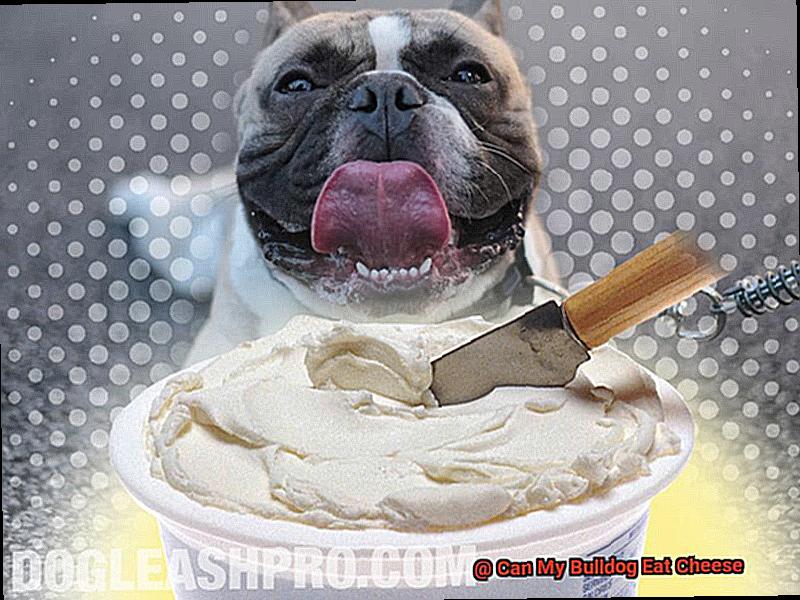
While these risks exist, it’s important to note that not all bulldogs will experience negative effects from consuming cheese. Some bulldogs may tolerate cheese well and enjoy it as an occasional treat without any adverse reactions.
To minimize the risks associated with feeding cheese to your bulldog, here are some tips:
- Choose low-fat varieties: Opt for low-fat cheeses to reduce the calorie and fat content.
- Offer in moderation: Cheese should be given as an occasional treat rather than a regular part of your bulldog’s diet.
- Monitor for reactions: Keep an eye out for any signs of digestive upset or allergic reactions when introducing new foods like cheese.
Remember, it’s always best to consult with your veterinarian before making any significant changes to your bulldog’s diet. They can provide personalized advice and guidance based on your bulldog’s specific needs.
What Types of Cheese Are Safe for Bulldogs to Eat?
French Bulldogs, with their adorable faces and playful personalities, quickly become beloved members of the family. As a responsible pet owner, you want to make sure your furry friend is happy and healthy. If you enjoy cheese, you might be wondering if it’s safe to share this treat with your bulldog. In this article, we’ll explore the types of cheese that are safe for bulldogs to eat and provide helpful insights to ensure their well-being.
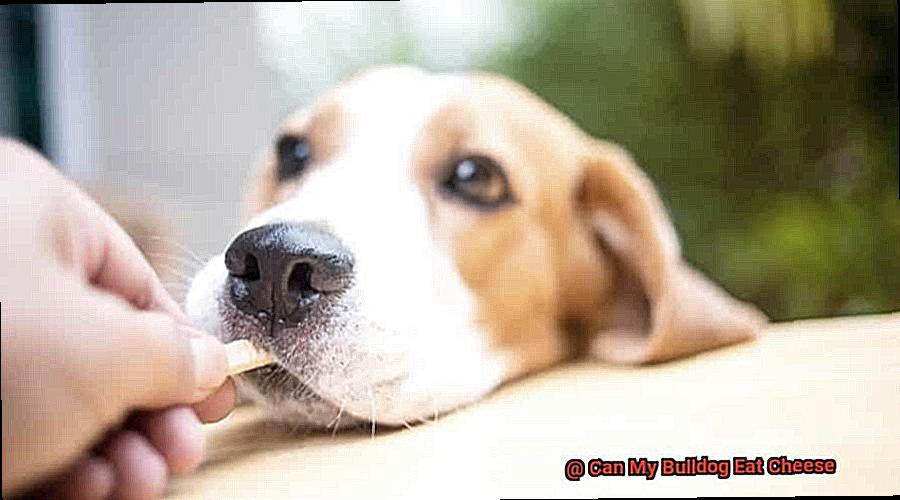
Safe Cheese Options for Bulldogs:
When it comes to cheese, not all types are created equal for your bulldog’s digestion. Some cheeses are safe, while others can cause tummy troubles. Here are some cheese options that are generally safe for bulldogs:
- Hard Cheeses: Cheddar, Swiss, and Parmesan cheeses are low in lactose, making them easier for bulldogs to digest. These delicious options can be enjoyed in moderation as a special treat or added as a tasty topping to their regular food.
- Cottage Cheese: Plain cottage cheese is another safe choice for bulldogs. It is low in lactose and packed with protein, making it a healthy addition to their diet. Just make sure to choose plain varieties without any added sugars or flavorings.
Cheeses to Avoid:
While some cheeses are safe for bulldogs, others should be avoided due to their higher lactose content or potentially harmful ingredients. Here are some cheeses to steer clear of:
- Soft Cheeses: Soft cheeses like Brie, Camembert, and blue cheese have higher lactose content and may lead to digestive issues in sensitive bulldogs. These cheeses can cause bloating, gas, or even diarrhea.
- Seasoned or Flavored Cheeses: Cheeses that contain ingredients like garlic or onion should be avoided as these can be toxic to dogs. Keep an eye out for any added spices or seasonings that may not be suitable for your bulldog.
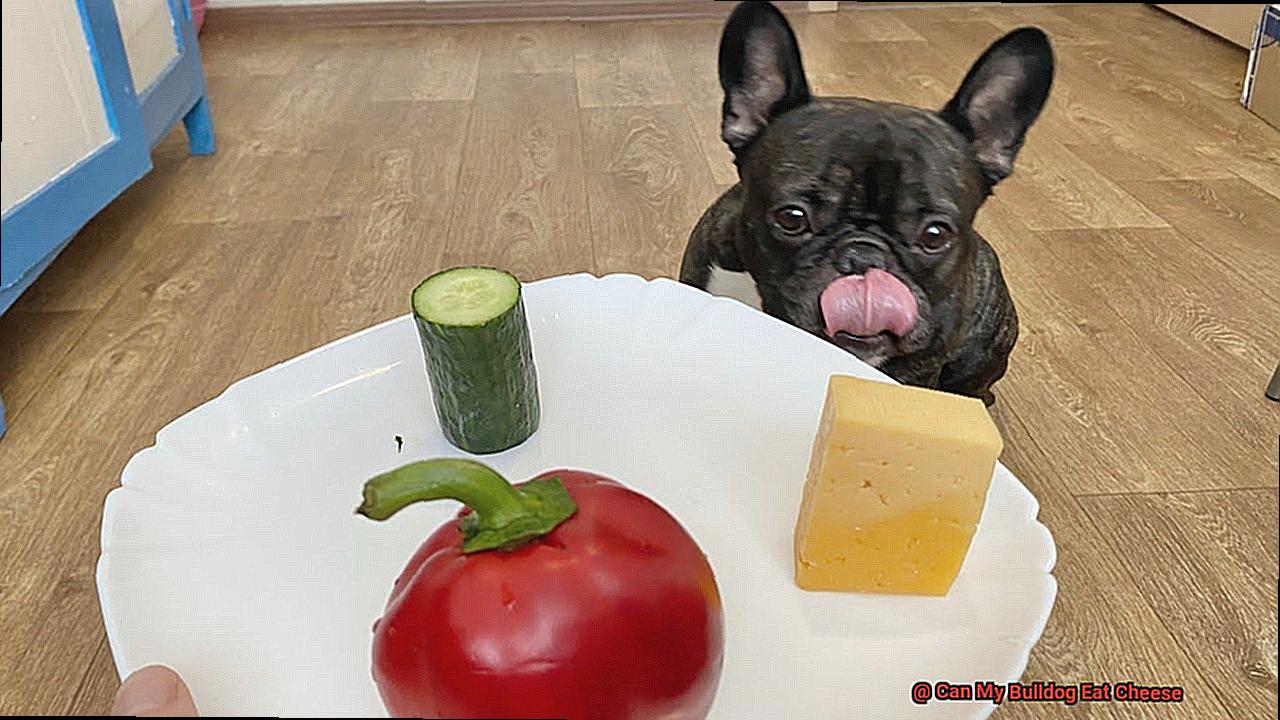
Moderation is Key:
While it’s safe for bulldogs to enjoy certain types of cheese, it’s important to remember that moderation is key. Cheese should never make up a large portion of their diet, but rather be given as an occasional treat or topping. Overconsumption of cheese can lead to weight gain, digestive issues, or other health problems.
How Should You Serve Cheese to Your Bulldog?
French Bulldogs are beloved companions known for their unique personalities and distinctive appearance. As a responsible owner, you want to provide your furry friend with occasional treats that are safe and enjoyable. Cheese can be a delicious option, but it’s important to serve it in a way that keeps your bulldog healthy and happy. In this guide, we’ll explore the best practices for serving cheese to your French Bulldog.
Choose the Right Cheese:

- Opt for low-fat or reduced-fat varieties to prevent weight gain and gastrointestinal issues.
- Avoid cheeses high in sodium or artificial additives that can be harmful to your bulldog’s health.
- Consult with your veterinarian for specific recommendations based on your bulldog’s dietary needs.
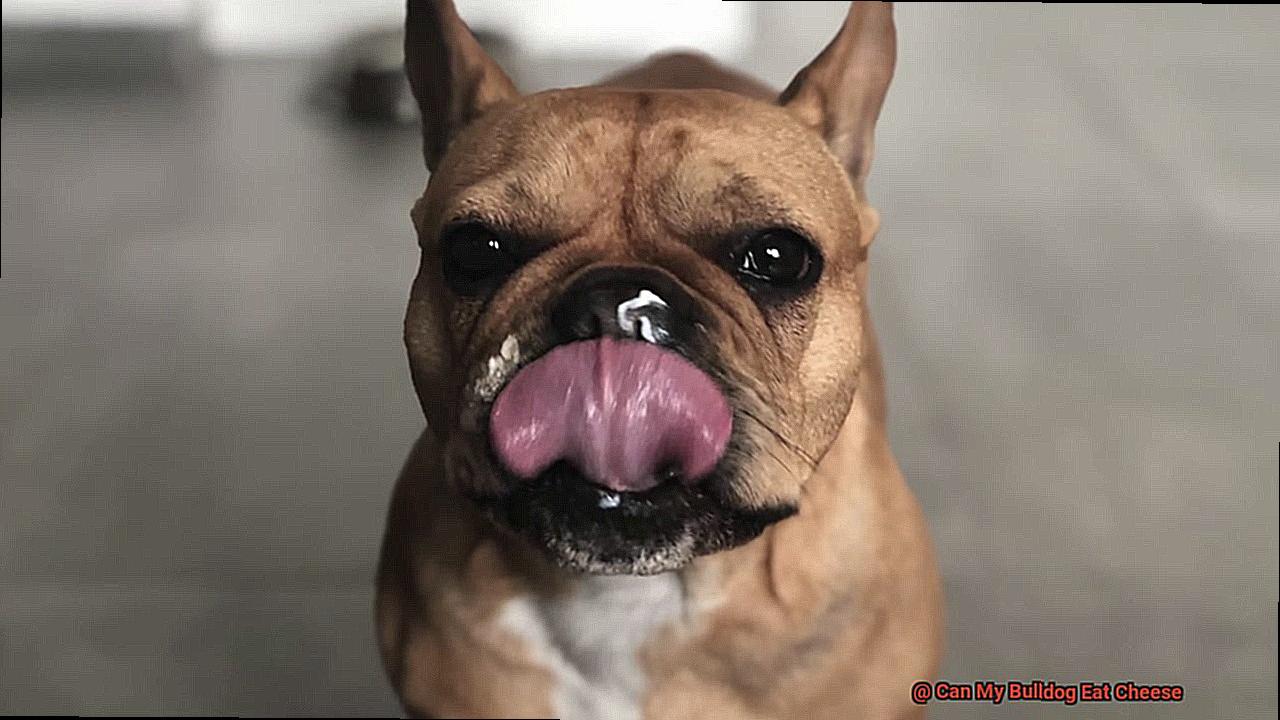
Cut It into Bite-Sized Pieces:
- Bulldogs have short snouts, making it challenging for them to chew larger pieces of food.
- Cutting the cheese into small, bite-sized pieces makes it easier for your bulldog to eat and digest.
- This also reduces the risk of choking, ensuring your bulldog’s safety.
Consider Lactose Intolerance:
- While most dogs can tolerate small amounts of lactose, some may experience digestive issues.
- If your bulldog shows signs of stomach upset or diarrhea after eating cheese, it may be best to avoid giving them this treat.
- Discuss any concerns with your veterinarian to determine if lactose-free options are better suited for your bulldog.
Practice Portion Control:
- Cheese should only be given as an occasional treat and not as a regular part of your bulldog’s diet.
- Too much cheese can lead to weight gain and other health issues.
- Consult with your veterinarian to determine the appropriate amount of cheese based on your bulldog’s age, weight, and overall health.
Supervise Your Bulldog:
- Always supervise your bulldog while they are enjoying their cheese treat.
- This ensures their safety and helps prevent any accidents or injuries that may occur while eating.
- If you have multiple dogs, separate them during feeding time to prevent food aggression or competition.
How Much Cheese Can a Bulldog Safely Eat?
Picture this: your adorable bulldog, with those irresistible puppy-dog eyes, begging for a taste of that gooey, delicious cheese. As a responsible pet owner, it’s essential to know just how much cheese is safe for your furry friend. In this blog post, we’ll dive into the details and help you navigate the cheesy maze of bulldog nutrition.
The Bulldog’s Digestive System:
Bulldogs have a sensitive digestive system, making it crucial to be mindful of what they consume. While cheese can provide nutritional benefits like protein and calcium, overindulgence can lead to digestive issues such as diarrhea and an upset stomach. Moderation is key.
Size Matters:
Consider your bulldog’s size when determining their cheese intake. Bulldog puppies have smaller tummies and should consume smaller amounts compared to adult bulldogs. As a general guideline, limit their cheese portion size to no more than 10% of their daily caloric intake.
Consult Your Veterinarian:
Every bulldog is unique, so it’s always best to consult with your veterinarian to get tailored recommendations for your furry friend. They can take into account factors like age, weight, and overall health to provide specific guidelines on cheese consumption.
Opt for Low-Fat Options:
To minimize the risk of weight gain and other health issues, choose low-fat or reduced-fat cheese options for your bulldog. This way, they can enjoy a cheesy treat without the guilt or potential adverse effects.
Monitor Your Bulldog’s Reaction:
Introduce cheese gradually into your bulldog’s diet and monitor their reaction closely. If you notice any adverse effects such as vomiting or excessive gas, it may be best to avoid feeding them cheese altogether.
Alternatives to Feeding Cheese to Your Bulldog
Some bulldogs can struggle with digesting dairy products due to lactose intolerance. But fret not, because I’ve got some amazing alternatives to cheese that your bulldog will love.
- Yogurt: This creamy delight is a great substitute for cheese. It has lower levels of lactose and contains probiotics that promote a healthy digestive system. Just make sure to choose plain, unsweetened yogurt without any added flavors or sweeteners.
- Lean meats: Bulldogs are known for their muscles, so why not give them a protein-packed treat? Cooked chicken, turkey, or lean beef are excellent options. Remember to remove any bones and skin before feeding it to your pup.
- Crunchy veggies: Some bulldogs enjoy the satisfying crunch of carrots or cucumber slices. These vegetables are low in calories and provide essential vitamins and minerals. Just chop them into small, manageable pieces to prevent choking hazards.
- Fruity goodness: Bulldogs can also indulge in the sweetness of fruits like apple slices or bananas. But remember, not all fruits are safe for dogs. Stay away from grapes and raisins as they can be toxic.
- Commercial dog treats: Sometimes, it’s easier to grab a ready-made treat specially formulated for bulldogs. These treats often contain high-quality ingredients and cater to their unique dietary needs.
But here’s the thing – always consult with your vet before making any changes to your bulldog’s diet. They know your pup’s specific needs and can offer personalized recommendations.
MwkV4spo-EQ” >
Conclusion
In conclusion, it is important to consider your bulldog’s individual needs and dietary restrictions before feeding them cheese.
While cheese can be a tasty treat for some dogs, it may not agree with others due to lactose intolerance or potential allergies. It’s always best to consult with your veterinarian before introducing any new foods into your bulldog’s diet.
They can provide personalized advice based on your dog’s specific health requirements.
